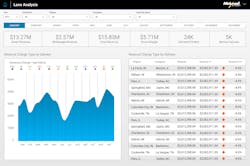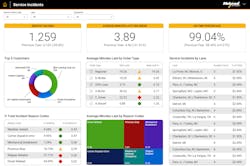GRAPEVINE, Texas—After more than a year without a large customer gathering, McLeod Software used its 2021 User Conference to announce new software and other product offerings that it said will make doing trucking business more profitable, thanks to advancements in artificial intelligence, machine learning, and automation.
More than 1,200 McLeod Software customers, employees, and vendor partners descended upon the Gaylord Texan for the company’s first in-person user conference since 2019. Along with the expansion of MPact into an MPactPro offering, here’s a roundup of other new products, expansions, and news from the Birmingham, Alabama-based software company.
Automation for onboarding new drivers
As the truck driver shortage continues this decade, many fleets are looking to hire the same drivers. Carriers can sometimes secure the best candidates by streamlining their driver onboarding processes to get that driver in the door, through orientation, and seated, McLeod noted. At its 2021 user conference, the trucking software company introduced Logix Solutions Driver Onboarding, a new product to help carriers automate tasks and speed up the process of driver onboarding, orientation, and preparing for dispatch. Automation for a driver’s exit or termination can also be managed with this new solution.
Carriers have the opportunity to reduce the time spent prior to orientation by having all the driver’s tasks electronically queued for them to complete with simple automated questions and interaction, company CEO Tom McLeod noted during the conference. Required documents for new drivers can be transformed into simple electronic forms that make communication with the driver easier.
McLeod said the new Driver Onboarding system will help the driver to quickly capture images of necessary items, such as licenses and signatures needed for a consent form. The information is then populated directly into LoadMaster, and the documents or images are indexed in McLeod’s DocumentPower.
Carriers can use the tool to customize their process. They can assign drivers specific tasks related to completing documents and capturing images, and they can build their own steps for orientation into the process. Training videos with quizzes or tests can be delivered to a driver’s mobile device or through a web page on their laptop. A carrier’s new hires don’t have to be onsite just to fill out paperwork and sign forms.
When it’s time to part ways with a driver, a McLeod tailored workflow for driver termination to automate and complete the process is included and can be configured by the carrier.
This solution helps to mitigate most of the back-and-forth delays, including waiting on paperwork. By transforming documents into simple workflows and electronic forms, integrating them with either a web browser or a mobile device, this customized task-driven workflow will help carriers hire drivers and get them on the road faster.
Automation to streamline carrier payments
McLeod’s Logix Solutions Carrier Invoice Processing provides brokers with a single location to complete carrier invoice activity, streamlining the payment process. Users can review and index carrier’s documents as they arrive. This workflow-driven process will capture the needed load information for billing and payment, storing the indexed documents directly into PowerBroker and DocumentPower.
“We’re trying to make things better fit into more types of operations and we hope that will help your operation,” McLeod said. “And the carrier invoice processing will help eliminate many of the repetitive tasks that you’ve got.”
Today, most carriers submit a high percentage of their invoices and documents to brokers via email. Carrier Invoice Processing takes advantage of this and builds the workflow from the point of each document’s arrival. Carriers can submit invoices and supporting documents to a monitored email account. Images that contain previously generated barcodes from the broker are indexed automatically. Using the broker’s order number, data lookups match and display relevant customer and carrier information from PowerBroker. Users are prompted to answer carrier-centric questions, such as Invoice Total, Detention Amount, Fuel Surcharge, Quick Pay, and other select items from drop-down lists can complete a workflow process. This solution helps the broker’s staff determine how to index and classify documents faster, so customer billing and carrier payments can be completed faster.
The Carrier Invoice Processing solution automates many tasks to remove the need for human interaction while providing a complete audit trail. McLeod said it developed this solution to alleviate common challenges faced by brokers today, including slow cash cycle, high labor costs, human error.
McLeod Data Fusion supply chain connectivity framework
McLeod Software’s DataFusion expands the company’s traditional EDI engine to provide a new framework for electronically communicating with customers and trading partners to meet the growing number of requirements in the supply chain. The DataFusion solution suite of optional modules is integral to McLeod’s LoadMaster and PowerBroker systems, making it possible to offer a wide range of data access and shipment visibility throughout the application.
The world is changing when it comes to methods and integration points for exchanging data. DataFusion brings a framework to give McLeod customers the ability to connect to their customers’ supply chains in new ways, such as API web services. DataFusion includes all of the existing ANSI standard EDI capabilities built on McLeod's current EDI Engine.
Business intelligence updates
A new version of McLeod IQ, the software company’s business intelligence and data warehouse product for LoadMaster and PowerBroker was also announced at the conference in Texas.
With the 2021 release, the McLeod IQ team has implemented several technology changes that will enable quicker data refreshes, an improved customization process, and allow for a smoother data update process, according to the company.
“We have moved away from our traditional MS SQL Server data replication and full model update process to a new incremental refresh method,” according to Mark Cubine, McLeod’s VP of marketing. “This new approach pulls only the data changes made since the previous data pull, so we are processing potentially hundreds of records instead of hundreds of thousands of records.”
This will allow McLeod to change its IQ analysis model updates from every one to two hours to approximately every five to 15 minutes and provide customers with more up-to-date information to run their daily operations.
By removing the MS SQL Server replication layer, McLeod said it has simplified the process and limited the number of potential issues with that technology. After its initial snapshot of the customer’s production data from LoadMaster or PowerBroker, it will utilize the auditing capabilities in the McLeod database to capture any changes to this data and then update the IQ data warehouse.
McLeod IQ now provides more insight and reporting options for Service. Customers will be able to start tracking details, such as On-Time Metrics, Delay Codes, Reason Codes, On-Time Metrics, Fault types, and more. According to the company, they can slice these metrics by Customer, Carriers, Driver, Lane, Dispatcher, etc. to help determine root cause and identify trends.
“We have added more time-series calculations for use with measures within IQ to give our customers a clearer picture of their trends over time,” according to Cubine. “For example, they can evaluate their margin percentage against the same period last year, year to date, prior period, and more. Customers can start predicting activity by looking into historical trends over time and season, helping to make better and more accurate projections.”
To enable its customers to dive deeper into analyzing the impact of each pickup and stop-off, McLeod said it added stop level details to the IQ data model. Customers can now explore detention and dwell time information for each pickup and stop location, miles between stops, sequence, unloading and loading times, weights, pallets, pieces, and more.
Continued growth for McLeod
McLeod Software saw continued sales growth throughout the pandemic, the company reported. In 2020, it set a record for the largest number of new customers in any year of the company’s 36-year history.
Revenues have followed and are up 12% in the twelve-month period ending July 2021, according to the company. And so far this year, sales growth is increasing even faster, with sales up 58% over the same January-to-August period of 2020.
The McLeod Software employee base has grown to over 550 people, up approximately 10% since the start of the pandemic in March 2020. McLeod now has over 1,100 active customers, who are transportation providers in the U.S. and Canada, according to a report shared during the user conference.






